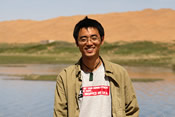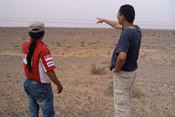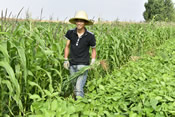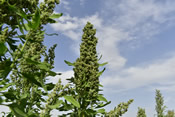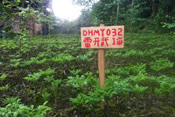
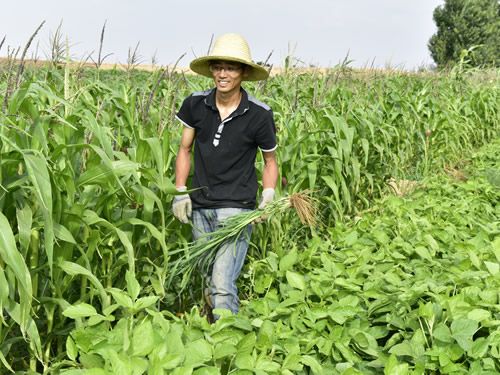 |
| A small ecological farm opened by Ma Yanwei and his friends. (Liu Long) |
Ma Yanwei (Founder of Quanxin Sustainable Development Centre of Alashan in Inner Mongolia, Former Programme Officer for Ecological Agriculture, PCD)
|
Editor’s note: Ma Yanwei was the Programme Officer (Ecological Agriculture) of PCD. He volunteered for environmental organisations when he was a student and was the first volunteer recruited by the Society of Entrepreneurs and Ecology (SEE) in Alashan. Since then he has been involved in activities for sustainable development and ecological conservation. In 2012, Ma and his friends established Quanxin Sustainable Development Centre to explore ways to combine sustainable development, cultural heritage and nature conservation. Alashan is one of the areas most affected by desertification. Quanxin aims to work with herders in Alashan to conserve Mongolian culture as well as the beautiful desert steppe. Quanxin also provides support to other community-based NGOs in capacity building and training for regional network building. In this article, Ma Yanwei shares frankly and unreservedly his experience in founding and running a new organisation. Ma covers a wide range of subjects ranging from the choice of their undertaking to responding to opportunities and making decisions; and from how he balances his work with his personal life to how he sustains his passion and enthusiasm for his project. His advice offers fascinating insights and sheds light on the path for those who follow in his footsteps. |
I resigned from PCD in the summer of 2011 and returned to Alashan in Mongolia.
The first thing that was on my mind then was how to earn a living for my family of three. I quickly helped my wife set up a tutoring centre. In the meantime I thought about and began planning my future.
A year later, my friends and I established Quanxin Sustainable Development Centre of Alashan. We wanted to undertake two kinds of work: (1) to nurture rural facilitators in Northwest China and (2) to explore a sustainable development path for Alashan.
To achieve our first objective, we have mainly been working with Oxfam to provide support to rural NGOs to develop their manpower and to improve their work in rural community development.
For local programmes in Alashan, at first we wanted to promote cooperative rotational grazing in the pastoral area as a means to support more sustainable management and use of grazing. After a lot of work, including preliminary survey and research as well as mobilisation of the community, the programme had to be shelved because we were unable to raise funds for it.
In 2015, two colleagues and I set up a small ecological farm. We wanted to explore ways to conserve water and to improve soil in agriculture in Alashan through agricultural experimentation.
Having gone through all sorts of ups and downs in the last few years, I was not quite happy with the development of our organisation. We have not done well in many ways. I can therefore only draw on the difficulties we have faced when sharing my thoughts about starting and running a new organisation.
(1) Do what you want, what you are capable of, and what you think is valued socially?
When you leave an organisation and start your own NGO, choosing your path is very important. The way people choose differs: some people have to weigh the pros and cons and consider all options, some simply go ahead when they have an idea, some people place emphasis on the types of work that have access to outside resources.
Here below is a graphic that I really like:
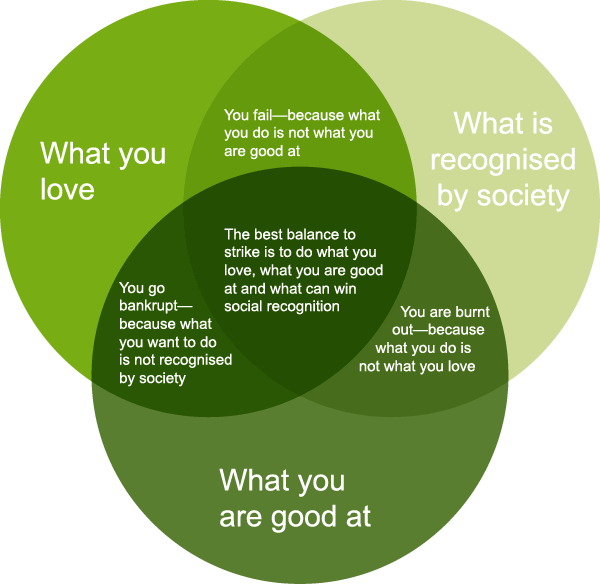
In order to minimise the obstacles and pressure you will face in starting up an organisation, it is crucial to find a balance between these three aspects. That is, you must find something that you love, that you are good at, and that has social value or wins social recognition.
(2) Accepting or rejecting an opportunity
The huge pressure of running an NGO in the mainland may mean that for the survival of the organisation, you take up projects which you do not really want, thus losing sight of the true purpose of your organisation.
For example, after the Ya’an earthquake in 2013, Quanxin got involved with preliminary evaluative activities. Since there was a need in areas affected by the earthquake and we had the capabilites, two of our staff stayed on site to take up a project for post-disaster reconstruction.
After the first phase of the project came to an end, there were calls for us to launch the second phase of the project. After discussing the situation, we decided that post-disaster reconstruction was not something we wanted to do in the long run, so we recommended another local partner to the sponsor and pulled out from the project.
(3) Maintaining a balance between your ideals and the reality
Sometimes the time may not yet be ripe for what you want to do. You have to think about how to balance reality and your ideals. For example, we spent over a year conducting surveys and researching rotational grazing, and some herders in the community were also interested in this idea. However, it was impossible to launch such a project without funding. The experience of raising funds for the project was really painful. Very few funders questioned the project itself: their main reason for rejecting our application was that Alashan was not their priority.
Thus we were forced to shelve the project and wait for future opportunities, or look for other and better ways to implement the programme.
(4) Continuous improvement
Recent years have seen the rise in popularity of the lean start-up method, a process by which change happens in small steps and improvement occurs during the process through experimentation and revision. The emphasis is on getting started and learning as you go along in order to minimise risk.
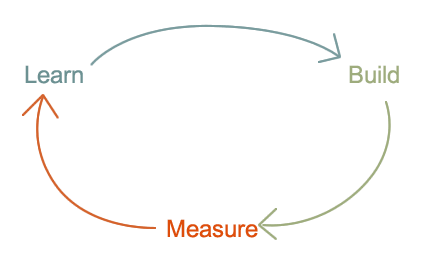
I had wanted very much to open an ecological farm, and so I decided to take action last year. First I found two mu(1) of suburban land and grew a few old varieties of grains, beans and waxy corns. I wanted to see which plant varieties would acclimatise to Alashan and eliminate those that could not.
This year we have leased 40 mu of land with the same idea in mind. Apart from the varieties that were successful in the earlier experiment, we cultivated a few more other varieties. Again some failed. Some old varieties of grains and beans that were successful last year continued to do well. From our 1-year experiment, we found that the old varieties of grains and beans were very suitable for Alashan. However, the quinoa that we rashly planted on 10 mu of land grew really tall, but there was little to harvest.
Actually we have not thought about the scale of our venture in the long run, nor where this path will lead us. Our dreams are after all constrained by reality. But we have started to do what we wanted to do. It is better just to make a start, and adapt while you are doing it, otherwise your ideas will remain as only that.
Even though the future is still unknown, we have been able to rule out some possibilities. The process of iteration has to be kept up, and we will continue to work in small, quick steps along the path that we have chosen.
(5) The difference between starting and running your own organisation and working for another organisation
There is a big difference between starting and running your own organisation and working for another organisation. In the former, there is a lot more pressure, as you have to be prepared for all sorts of unexpected things and be ready to make adjustments.
Moreover, when you start a new organisation, you will inevitably be constrained in terms of resources. When you cannot find the right people to take up different positions, you will often end up assuming different roles and shifting between different types of work, and thus will have to be psychologically prepared to be a Jack-of-all-trades.
In addition, in my experience, there is a big difference in terms of the mindset. When I worked for another organisation, I always thought that I was rather dedicated to my work. However I was never too happy to go on long business trips or work overtime because I felt that my personal life was affected too much .
Now when I work for my own organisation, ‘weekends’ have no more meaning for me and the impact on my personal life is bigger than before. There is nothing I can do except feel guilty about taking time out from my family to work. However, I have been looking for ways to make up for it, such as being more mindful when I am spending time with my family so that we are spending quality time together.
Now I complain less about others. Instead I focus on looking for ways to deal with the problems that I face.
(6) Lifelong learning
Perhaps each and every one of us needs to develop the necessary capacity and attitude conducive to lifelong learning. This is all the more so for someone starting a new organisation!
The external environment changes rapidly. Ever since my friends and I set up our organisation, we have been confronted with all kinds of challenges. Because of this, no matter how busy or tired we are, we always make sure that we still have the time and the energy to continue to learn.
Note:


